
The Bloc Québécois is a federal political party in Canada devoted to Quebec nationalism and the promotion of Quebec sovereignty. The Bloc was formed by Members of Parliament (MPs) who defected from the federal Progressive Conservative Party and Liberal Party during the collapse of the Meech Lake Accord. Founder Lucien Bouchard had been a cabinet minister in the federal Progressive Conservative government of Brian Mulroney.

Poutine is a dish of french fries and cheese curds topped with a brown gravy. It emerged in Quebec, in the late 1950s in the Centre-du-Québec region, though its exact origins are uncertain and there are several competing claims regarding its invention. For many years, it was used by some to mock Quebec society. Poutine later became celebrated as a symbol of Québécois culture and the province of Quebec. It has long been associated with Quebec cuisine, and its rise in prominence has led to its growing popularity throughout the rest of Canada.
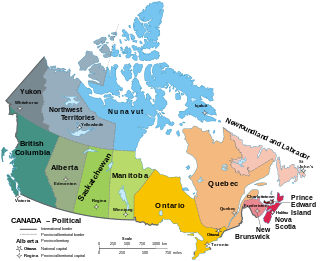
Canada has ten provinces and three territories that are sub-national administrative divisions under the jurisdiction of the Canadian Constitution. In the 1867 Canadian Confederation, three provinces of British North America—New Brunswick, Nova Scotia, and the Province of Canada —united to form a federation, becoming a fully independent country over the next century. Over its history, Canada's international borders have changed several times as it has added territories and provinces, making it the world's second-largest country by area.

Quebec City, officially Québec, is the capital city of the Canadian province of Quebec. As of July 2021, the city had a population of 549,459, and the metropolitan area had a population of 839,311. It is the eleventh-largest city and the seventh-largest metropolitan area in Canada. It is also the second-largest city in the province, after Montreal. It has a humid continental climate with warm summers coupled with cold and snowy winters.
The Parti Québécois is a sovereignist and social democratic provincial political party in Quebec, Canada. The PQ advocates national sovereignty for Quebec involving independence of the province of Quebec from Canada and establishing a sovereign state. The PQ has also promoted the possibility of maintaining a loose political and economic sovereignty-association between Quebec and Canada. The party traditionally has support from the labour movement; however, unlike most other social democratic parties, its ties with organized labour are informal. Members and supporters of the PQ are nicknamed péquistes, a French word derived from the pronunciation of the party's initials in Quebec French.

French Canadians, or Franco-Canadians, are an ethnic group who trace their ancestry to French colonists who settled in France's colony of Canada beginning in the 17th century.

The Quebec Liberal Party is a provincial political party in Quebec. It has been independent of the federal Liberal Party of Canada since 1955. The QLP has always been associated with the colour red; each of their main opponents in different eras have been generally associated with the colour blue.

The Quebec Maritimes Junior Hockey League is one of the three major junior ice hockey leagues that constitute the Canadian Hockey League. Officially the Quebec Major Junior Hockey League until 2023, the league includes teams in Quebec and the Maritime provinces of Nova Scotia, New Brunswick, and Prince Edward Island.

The Quebec sovereignty movement is a political movement whose objective is to achieve the independence of Quebec from Canada. Sovereignists suggest that the people of Quebec make use of their right to self-determination – a principle that includes the possibility of choosing between integration with a third state, political association with another state or independence – so that Québécois, collectively and by democratic means, give themselves a sovereign state with its own independent constitution.
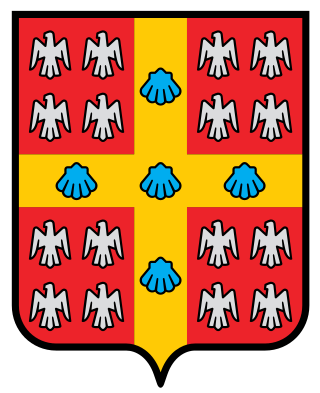
Université Laval is a French-language public research university in Quebec City, Quebec, Canada. The university was founded by François de Montmorency-Laval as Séminaire de Québec in 1663, making it the oldest institution of higher education in Canada and the first North American institution to offer higher education in French. The university, which was founded in Old Québec, moved to a new campus in the 1950s in the suburban borough of Sainte-Foy–Sillery–Cap-Rouge. It is ranked among the top 10 Canadian universities in research funding and holds four Canada Excellence Research Chairs.
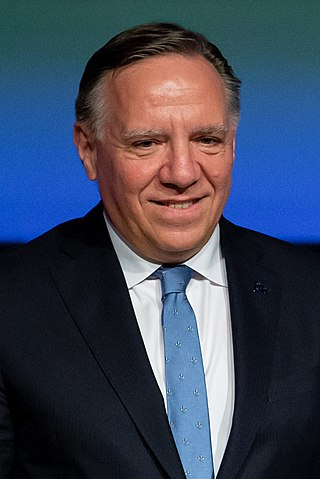
The premier of Quebec is the head of government of the Canadian province of Quebec. The current premier of Quebec is François Legault of the Coalition Avenir Québec, sworn in on October 18, 2018, following that year's election.

The Province of Quebec was a colony in British North America which comprised the former French colony of Canada. It was established by the Kingdom of Great Britain in 1763, following the conquest of New France by British forces during the Seven Years' War. As part of the Treaty of Paris, France gave up its claim to the colony; it instead negotiated to keep the small profitable island of Guadeloupe.
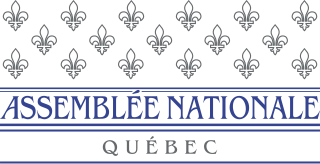
The National Assembly of Quebec is the legislative body of the province of Quebec in Canada. Legislators are called MNAs. The King in Right of Quebec, represented by the lieutenant governor of Quebec, and the National Assembly compose the Legislature of Quebec, which operates in a fashion similar to those of other Westminster-style parliamentary systems. The assembly has 125 members elected first past the post from single-member districts.
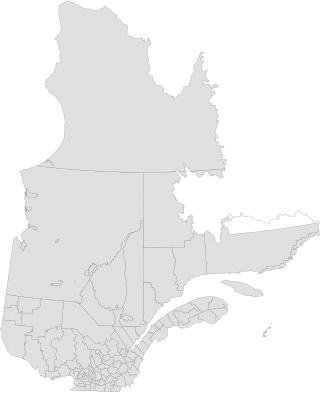
The term regional county municipality or RCM is used in Quebec, Canada to refer to one of 87 county-like political entities. In some older English translations they were called county regional municipality.
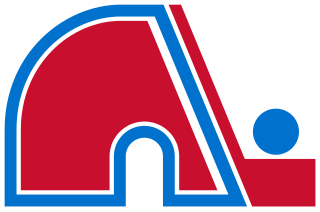
The Quebec Nordiques were a professional ice hockey team based in Quebec City. The Nordiques played in the World Hockey Association (1972–1979) and the National Hockey League (1979–1995). The franchise was relocated to Denver, Colorado in May 1995 and renamed the Colorado Avalanche. They played their home games at the Colisée de Québec from 1972 to 1995.

Eastern Canada is generally considered to be the region of Canada south of Hudson Bay/Hudson Strait and east of Manitoba, consisting of the following provinces : Newfoundland and Labrador, Nova Scotia, Prince Edward Island, New Brunswick, Quebec and Ontario.
The following is a list of the types of local and supralocal territorial units in Quebec, Canada, including those used solely for statistical purposes, as defined by the Ministry of Municipal Affairs, Regions and Land Occupancy and compiled by the Institut de la statistique du Québec.

Montreal is the second most populous city in Canada, the tenth most populous city in North America, and the most populous city in the province of Quebec. Founded in 1642 as Ville-Marie, or "City of Mary", it is named after Mount Royal, the triple-peaked hill around which the early city of Ville-Marie was built. The city is centred on the Island of Montreal, which obtained its name from the same origin as the city, and a few much smaller peripheral islands, the largest of which is Île Bizard. The city is 196 km (122 mi) east of the national capital, Ottawa, and 258 km (160 mi) southwest of the provincial capital, Quebec City.















